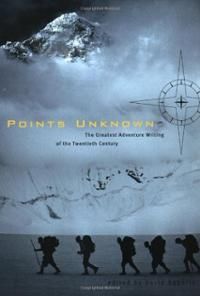Points Unknown: A Century of Great Exploration
David Roberts (ed)
Roberts, David (ed);
Points Unknown: A Century of Great Exploration
Outside Books / W.W. Norton, 2000
ISBN 0393050009
topics: | travel | adventure | first-contact
This is a great book with first hand stories of great journeys - Scott's last diary, Jon Krakauer (before Everest), and others, from the adventure magazine Outside.
The following excerpt is based on one of the chapters, dealing with the reactions of a native tribe in Papua when they encounter the "civilized" world for the first time in their history,
Fifty years after the initial trip, two of them re-visit the island and meet the same tribesmen - the kids have now grown old - and find out their reactions.
First Contact: New Guinea Highlanders Encounter the Outside World
Bob Connolly and Robin Anderson, p.125-138
[Two Australian film-makers visit the Highland to seek out the elders who still remember the visit of Michael Leahy and Michael Dwyer to PNG in 1930 summer. The people used stone axes and thought they were the the only people in the world. They were amazed at the efficacy of steel axes and blades.]
Fifty years later the highland people recall these events with a certain amusement. But their belief in a spirit world gave them a ready-made framework into which the coming of the Australians and their carriers fitted easily, enabling them to come to terms quickly with an even for which they were totally unprepared . . . It was only a short steo fir the highlanders to imagine that they recognized particular individuals -- prominent men, fathers, brothers, sons.
Sole Sole from Gorohonota: "We were all gathered there watching these strange people when one of the white men pulled out his teeth. Everyone just ran in all directions. [Michael Dwyer had false teeth, which he used to disperse crowds.] The highlanders were anxious to detect any areas of similarity between themselves and the strangers. Did they eat? Drink? Sleep? Defecate? "Because they wore lap laps [skirts] and trousers," says Kirupano Eza'e of Seigu, "the people said 'We think they have no wastes in them. How could they when they were wrapped up so neatly and completely?' We wondered how excreta could be passed. We wondered much about that." [They used a screened latrine pit.] But the highlander's curiosity could not be left unsatisfied for long. "One of the people hid," recalls Kirupano, "and watched them going to excrete. He came back and said, 'Those men from heaven went to excrete over there.' Once they had left many men went to take a look. When they saw that it smelt bad, they said, 'Their skin might be different, but their shit smells bad like ours." The strangers bodies were covered in a strange material. They must have something important to hide. "We had only our traditional dress to cover our private parts," says Gasowe of Makiroka village in the Asaro. "So when we saw the strangers, we thought they must have a huge penis they were trying to cover up. We thought it must be so long it was wrapped round and round their waists." . . . Reinforcing these assumptions were more mythological stories - dealing with the exploits of men with giant penises. [131] As for the night lanterns, it seemed these men from heaven had brought the moon with them, or a piece of it. [133] -- 'First Contact,'' produced and directed by Bob Connolly and Robin Anderson, is an astonishing record of the meeting between the Leahys and - by the film's estimate - about a million tribesmen whose existence had been unknown to the outside world. In addition to the Leahys' footage, which captures this clash of cultures with an un-self-consciousness that is virtually absolute, Some of the natives, who are now in more or less modern dress, remember their original perceptions of the white men in amusing detail. When they saw the prospectors' rucksacks, for instance, ''we thought their wives must be in those bags.'' The Leahys' khaki trousers fostered another misconception: ''We thought they must not have body wastes in them because they were wrapped up so neatly.'' Among their other, less benign recollections is the Leahys' shooting a pig to show the natives what guns could do, and to discourage any would-be thieves. This is actually captured on film, as is the tribe's first exposure to airplanes, gramophones and tin cans. - Film review http://query.nytimes.com/gst/fullpage.html?res=9800E0DD1F39F934A35751C1A965948260
amitabha mukerjee (mukerjee [at-symbol] gmail) 2013 Sep 06
